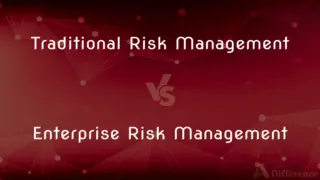Crazy vs. Wild — What's the Difference?
Edited by Tayyaba Rehman — By Urooj Arif — Updated on April 25, 2024
Crazy often implies erratic behavior or mental instability, while wild suggests unrestrained, natural, or untamed characteristics.

Difference Between Crazy and Wild
Table of Contents
ADVERTISEMENT
Key Differences
Crazy is commonly used to describe something or someone exhibiting irrational or unpredictable behavior, often linked to mental health or extreme emotional states. On the other hand, wild is typically associated with nature and animals, emphasizing a state of being natural, free, and untamed.
Crazy can also refer to situations or actions that are considered absurd or defy logical explanation, enhancing the notion of extreme deviation from the norm. Whereas, wild can describe environments or behaviors that are primitive and untouched by human influence, highlighting an elemental and inherent chaos.
In popular culture, crazy often carries a negative connotation, pointing towards actions or ideas that are out of the norm or socially unacceptable. Conversely, wild is frequently romanticized or viewed positively, especially in contexts that value freedom, adventure, and a return to nature.
In terms of intensity, crazy might be used to describe more severe or intense levels of irrationality or mental distress. Whereas, wild might refer to something less severe, like high spirits or energetic enthusiasm, without necessarily implying a psychological condition.
Linguistically, "crazy" can be used both as an adjective and a noun (the latter as slang for a person with mental illness), while "wild" is primarily an adjective but also functions as a noun to describe natural wilderness areas.
ADVERTISEMENT
Comparison Chart
Definition
Indicating mental instability or irrational behavior.
Pertaining to natural, untamed state or manner.
Usage in context
Used to describe behavior or situations.
Often used to describe nature, animals, or behavior.
Connotation
Generally negative or associated with extremeness.
Can be positive, emphasizing freedom and natural state.
Intensity
Implies more severe or bizarre conditions.
Implies a spirited or unrestrained quality, less intense than crazy.
Linguistic function
Functions as both adjective and noun (slang).
Primarily an adjective, but also a noun describing wilderness.
Compare with Definitions
Crazy
Extremely enthusiastic.
She is crazy about opera.
Wild
Living in a natural state, not domesticated.
They saw a wild boar in the forest.
Crazy
Intensely enthusiastic about or preoccupied with;
Crazy about cars and racing
Wild
Lacking cultivation or civilization.
The island was wild and uninhabited.
Crazy
Very strange or unlikely.
It was a crazy idea to walk home alone.
Wild
Uncontrolled or unrestrained.
The party got wild after midnight.
Crazy
Impractical.
He has some crazy scheme for getting rich overnight.
Wild
Excitingly erratic.
He has a wild imagination.
Crazy
Disorderly or chaotic.
Things got crazy at the concert.
Wild
Very enthusiastic or excited.
The crowd went wild when the band appeared.
Crazy
Mad, especially as manifested in wild or aggressive behaviour
Stella went crazy and assaulted a visitor
A crazy look
Wild
(of an animal or plant) living or growing in the natural environment; not domesticated or cultivated
Wild strawberries
A herd of wild goats
Crazy
Extremely enthusiastic
I'm crazy about Cindy
A football-crazy bunch of boys
Wild
(of a place or region) uninhabited, uncultivated, or inhospitable
The wild coastline of Cape Wrath
An expanse of wild moorland
Crazy
(of an angle) appearing absurdly out of place or unlikely
The monument leant at a crazy angle
Wild
Lacking discipline or restraint
Wild parties were never her scene
Crazy
Extremely
I've been crazy busy
Wild
Not based on sound reasoning or probability
A wild guess
Wild rumours were circulating
Performing in Hollywood was beyond my wildest dreams
Who, even in their wildest dreams, could have anticipated such a victory?
Crazy
A mad person
Keep that crazy away from me
Wild
(of a playing card) deemed to have any value, suit, colour, or other property in a game at the discretion of the player holding it.
Crazy
Mentally deranged.
Wild
A natural state or uncultivated or uninhabited region
Kiwis are virtually extinct in the wild
Crazy
(Informal) Odd or eccentric in behavior.
Wild
Treat (a person or animal) harshly, so that they become untrusting or nervous
Let your pigeon fly for a while: we don't want to wild him
Crazy
Possessed by enthusiasm or excitement
The crowd at the game went crazy.
Wild
Occurring, growing, or living in a natural state; not domesticated, cultivated, or tamed
Wild geese.
Edible wild plants.
Crazy
Immoderately fond; infatuated
Was crazy about boys.
Wild
Not inhabited or farmed
Remote, wild country.
Crazy
Intensely involved or preoccupied
Is crazy about cars and racing.
Wild
Uncivilized or barbarous.
Crazy
Foolish or impractical; senseless
A crazy scheme for making quick money.
Wild
Lacking supervision or restraint
Wild children living in the street.
Crazy
Intensely annoyed or irritated
It makes me crazy when you don't tell me you're going to be late.
Wild
Disorderly; unruly
A wild scene in the school cafeteria.
Crazy
Disorderly or askew
One of the old window shutters hung at a crazy angle.
Wild
Characterized by a lack of moral restraint; dissolute or licentious
Recalled his wild youth with remorse.
Crazy
(Informal) Extremely; very
That restaurant's always crazy busy on weekends, but it's worth the wait.
Wild
Lacking regular order or arrangement; disarranged
Wild locks of long hair.
Crazy
One who is or appears to be mentally deranged
"To them she is not a brusque crazy, but 'appropriately passionate'" (Mary McGrory).
Wild
Full of, marked by, or suggestive of strong, uncontrolled emotion
Wild with jealousy.
A wild look in his eye.
A wild rage.
Crazy
Of unsound mind; insane; demented.
His ideas were both frightening and crazy.
Wild
Extravagant; fantastic
A wild idea.
Crazy
Out of control.
When she gets on the motorcycle she goes crazy.
Wild
Furiously disturbed or turbulent; stormy
Wild weather.
Crazy
Very excited or enthusiastic.
He went crazy when he won.
Wild
Risky; imprudent
Wild financial schemes.
Crazy
In love; experiencing romantic feelings.
Why is she so crazy about him?
Wild
Impatiently eager
Wild to get away for the weekend.
Crazy
(informal) Very unexpected; wildly surprising.
The game had a crazy ending.
Wild
(Informal) Highly enthusiastic
Just wild about the new music.
Crazy
(obsolete) Flawed or damaged; unsound, liable to break apart; ramshackle.
Wild
Based on little or no evidence or probability; unfounded
Wild accusations.
A wild guess.
Crazy
(obsolete) Sickly, frail; diseased.
Wild
Deviating greatly from an intended course; erratic
A wild bullet.
Crazy
(slang) Very, extremely.
That trick was crazy good.
Wild
(Games) Having an equivalence or value determined by the cardholder's choice
Playing poker with deuces wild.
Crazy
An insane or eccentric person; a crackpot.
Wild
In a wild manner
Growing wild.
Roaming wild.
Crazy
Eccentric behaviour; lunacy; craziness.
Wild
A natural or undomesticated state
Returned the zoo animals to the wild.
Plants that grow abundantly in the wild.
Crazy
Characterized by weakness or feebleness; decrepit; broken; falling to decay; shaky; unsafe.
Piles of mean andcrazy houses.
One of great riches, but a crazy constitution.
They . . . got a crazy boat to carry them to the island.
Wild
Often wilds A region that is mostly uninhabited or uncultivated
The wilds of the northern steppes.
Crazy
Broken, weakened, or dissordered in intellect; shattered; demented; deranged.
Over moist and crazy brains.
Wild
To go about in a group threatening, robbing, or attacking others.
Crazy
Inordinately desirous; foolishly eager.
The girls were crazy to be introduced to him.
Wild
; not domesticated; specifically, in an unbroken line of undomesticated animals (as opposed to feral, referring to undomesticated animals whose ancestors were domesticated).
Przewalski's horses are the only remaining wild horses.
Crazy
Someone deranged and possibly dangerous
Wild
From or relating to wild creatures.
Wild honey
Crazy
Affected with madness or insanity;
A man who had gone mad
Wild
Unrestrained or uninhibited.
I was filled with wild rage when I discovered the infidelity, and punched a hole in the wall.
Crazy
Foolish; totally unsound;
An impractical solution
A crazy scheme
Half-baked ideas
A screwball proposal without a prayer of working
Wild
, unruly, or licentious.
The fraternity was infamous for its wild parties, which frequently resulted in police involvement.
Crazy
Marked by foolish or unreasoning fondness;
She was crazy about him
Gaga over the rock group's new album
He was infatuated with her
Wild
(electrical engineering) Of unregulated and varying frequency.
The aircraft's navigational equipment should not be powered from the wild AC bus except in an emergency, as its computers can be damaged by variations in electrical frequency.
Crazy
Possessed by inordinate excitement;
The crowd went crazy
Was crazy to try his new bicycle
Wild
Visibly and overtly anxious; frantic.
Her mother was wild with fear when she didn't return home after the party.
Crazy
Bizarre or fantastic;
Had a crazy dream
Wore a crazy hat
Wild
; very angry.
Wild
, tangled, or untidy.
After a week on the trail without a mirror, my hair was wild and dirty.
Wild
Very inaccurate; far off the mark.
The novice archer fired a wild shot and hit her opponent's target.
Wild
To the wind and sea; unsheltered.
A wild roadstead
Wild
To steer.
Wild
Not capable of being represented as a finite closed polygonal chain.
Wild
(slang) Amazing, awesome, unbelievable.
Did you hear? Pat won the lottery! — Wow, that's wild!
Wild
Able to stand in for others, e.g. a card in games, or a text character in computer pattern matching.
In this card game, aces are wild: they can take the place of any other card.
Wild
Of an audio recording: intended to be synchronized with film or video but recorded separately.
A wild track; wild sound
Wild
Inaccurately; not on target.
The javelin flew wild and struck a spectator, to the horror of all observing.
Wild
(of an audio recording) Intended to be synchronized with film or video but recorded separately.
Let's record it wild.
Wild
The undomesticated state of a wild animal.
After mending the lion's leg, we returned him to the wild.
Wild
A wilderness.
Wild
To commit random acts of assault, robbery, and rape in an urban setting, especially as a gang.
Wild
(In the form wilding or wildin') To act in a strange or unexpected way.
Wild
Living in a state of nature; inhabiting natural haunts, as the forest or open field; not familiar with, or not easily approached by, man; not tamed or domesticated; as, a wild boar; a wild ox; a wild cat.
Winter's not gone yet, if the wild geese fly that way.
Wild
Growing or produced without culture; growing or prepared without the aid and care of man; native; not cultivated; brought forth by unassisted nature or by animals not domesticated; as, wild parsnip, wild camomile, wild strawberry, wild honey.
The woods and desert caves,With wild thyme and gadding vine o'ergrown.
Wild
Desert; not inhabited or cultivated; as, wild land.
Wild
Savage; uncivilized; not refined by culture; ferocious; rude; as, wild natives of Africa or America.
Wild
Not submitted to restraint, training, or regulation; turbulent; tempestuous; violent; ungoverned; licentious; inordinate; disorderly; irregular; fanciful; imaginary; visionary; crazy.
What are theseSo withered and so wild in their attire ?
With mountains, as with weapons, armed; which makesWild work in heaven.
The wild winds howl.
Search then the ruling passion, there, aloneThe wild are constant, and the cunning known.
Wild
Exposed to the wind and sea; unsheltered; as, a wild roadstead.
Wild
Indicating strong emotion, intense excitement, or ewilderment; as, a wild look.
Wild
Hard to steer; - said of a vessel.
Wild
An uninhabited and uncultivated tract or region; a forest or desert; a wilderness; a waste; as, the wilds of America; the wilds of Africa.
Then Libya first, of all her moisture drained,Became a barren waste, a wild of sand.
Wild
Wildly; as, to talk wild.
Wild
A wild primitive state untouched by civilization;
He lived in the wild
Wild
A wild and uninhabited area
Wild
Marked by extreme lack of restraint or control;
Wild ideas
Wild talk
Wild originality
Wild parties
Wild
In a natural state; not tamed or domesticated or cultivated;
Wild geese
Edible wild plants
Wild
In a state of extreme emotion;
Wild with anger
Wild with grief
Wild
Deviating widely from an intended course;
A wild bullet
A wild pitch
Wild
(of colors or sounds) intensely vivid or loud;
A violent clash of colors
Her dress was a violent red
A violent noise
Wild colors
Wild shouts
Wild
Not subjected to control or restraint;
A piano played with a wild exuberance
Wild
Talking or behaving irrationally;
A raving lunatic
Wild
Produced without being planted or without human labor;
Wild strawberries
Wild
Located in a dismal or remote area; desolate;
A desert island
A godforsaken wilderness crossroads
A wild stretch of land
Waste places
Wild
Without civilizing influences;
Barbarian invaders
Barbaric practices
A savage people
Fighting is crude and uncivilized especially if the weapons are efficient
Wild tribes
Wild
(of the elements) as if showing violent anger;
Angry clouds on the horizon
Furious winds
The raging sea
Wild
In an uncontrolled and rampant manner;
Weeds grew rampantly around here
Wild
In a wild or undomesticated manner;
Growing wild
Roaming wild
Common Curiosities
Can wild be used positively?
Yes, wild often has positive connotations when it refers to natural beauty, freedom, and spontaneity.
What is a legal implication of calling someone crazy?
Legally, calling someone crazy can be defamatory if it falsely implies mental instability and causes harm to the person’s reputation.
What are historical uses of crazy and wild?
Historically, crazy has been used pejoratively to describe people with mental illness, while wild has been used to describe unexplored or unconquered natural areas.
What are some synonyms for crazy and wild?
Synonyms for crazy include insane, lunatic, and mad. Synonyms for wild include untamed, savage, and feral.
How do the terms evolve in modern language?
Both terms evolve with changing societal attitudes towards mental health and environmental awareness.
What does crazy mean in a medical context?
In medical terms, crazy is an informal and outdated term that once described individuals with mental health disorders, now considered inappropriate and stigmatizing.
How does the usage of crazy differ from wild in everyday language?
Crazy often refers to extreme or absurd situations or behaviors, while wild refers to untamed, natural states or spirited behaviors.
Is it offensive to use crazy to describe someone?
Yes, using crazy to describe someone can be offensive as it trivializes mental health issues.
When can wild refer to a location?
Wild can describe locations that are in a natural state and not cultivated or developed by humans.
How does cultural perception affect the use of crazy and wild?
Cultural context significantly affects these terms; for example, some cultures might find the celebration of wild nature more acceptable than labeling behaviors as crazy.
Are crazy and wild interchangeable in describing excitement?
They can be, but typically wild describes a positive, energetic excitement, while crazy might imply a more chaotic, unpredictable type of excitement.
Can both terms be used humorously?
Yes, both terms are often used humorously in various contexts to emphasize extreme or surprising elements.
Can wild animals become crazy?
The term crazy isn't typically used for animals; wild animals can display erratic behavior due to stress or captivity.
How do movies portray crazy and wild characters?
Movies often use crazy for characters with unpredictable or dangerous behavior and wild for characters who are free-spirited or rebellious.
Is it appropriate to describe weather as crazy or wild?
Yes, both terms are used metaphorically to describe severe or unpredictable weather conditions, like a crazy storm or wild winds.
Share Your Discovery

Previous Comparison
Intent vs. Purpose
Next Comparison
Physic vs. LaxativeAuthor Spotlight
Written by
Urooj ArifUrooj is a skilled content writer at Ask Difference, known for her exceptional ability to simplify complex topics into engaging and informative content. With a passion for research and a flair for clear, concise writing, she consistently delivers articles that resonate with our diverse audience.
Edited by
Tayyaba RehmanTayyaba Rehman is a distinguished writer, currently serving as a primary contributor to askdifference.com. As a researcher in semantics and etymology, Tayyaba's passion for the complexity of languages and their distinctions has found a perfect home on the platform. Tayyaba delves into the intricacies of language, distinguishing between commonly confused words and phrases, thereby providing clarity for readers worldwide.














































